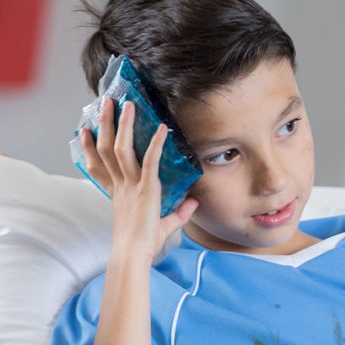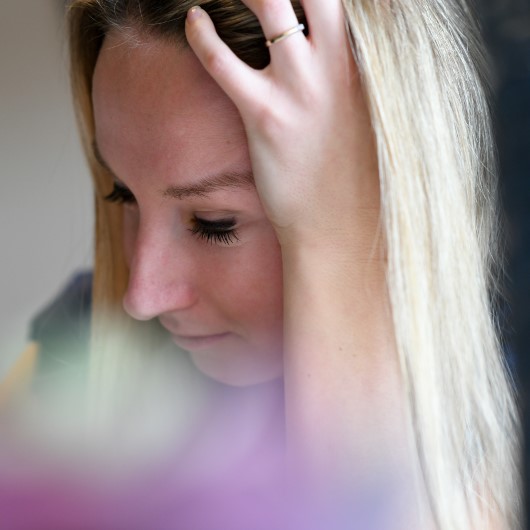Unsure it's a Concussion? Here Are 5 Signs You Should Seek Care for Your Child

September 24, 2020
It’s not always easy to know if someone has a concussion. Movies and pop culture sometimes portray the scene much more dramatically than what happens in real life.
An epic collision. Everything goes dark. You wake up to a crowd of onlookers staring down at you.
Yes, that scenario can be true; however, concussions can happen much more subtly than expected.
As some fall sports may be resuming with safety modifications to manage the spread of COVID-19, we asked the experts how to spot a concussion and the key signs.
To start, what exactly is a concussion?
“A concussion results from a blow to the head or body that causes the brain to move within the skull – this results in a transient alteration of brain function. Simply put, because the brain has shifted around inside the skull, it changes how the brain operates,” shares Felicia Gliksman, M.D. pediatric neurologist at Hackensack University Medical Center.
What are visible signs of a concussion?
“Keeping watch of your child in play is very important – if you’re at a sports game and you see someone get hit, fall to the ground and not move for a moment, you’ll want to keep a keen eye on them afterwards to look for concussion signs,” advises Dr. Gliksman.
Signs of concussion can include:
- Clenching of the head
- Disorientation or confusion
- Slurred speech
- Lack of coordination
- Vacant stare
“These are signs that can be visibly observed, and then there are signs that are more subjective – you’ll have to ask your child how they’re feeling. For example, just from looking at them, you wouldn’t know if they have a headache,” shares Dr. Gliksman.
What are non-visible symptoms of a concussion?
“If you notice your child gets hit or takes a fall, make sure you ask them how they are feeling,” advises Dr. Gliksman. “Every patient is different, but most of the time, a headache occurs almost immediately. Some of the later symptoms can be a persistent headache, poor attention, light headedness, easy irritability, intolerance to light or sleep disturbances.”
What should I do if I suspect my child has a concussion?
“If you suspect your child may have a concussion, make sure you remove them from play and don’t let them return until seeing a health care professional,” shares Kristine Keane, Psy. D., clinical director for Concussion for Hackensack Meridian Health. “Unconsciousness, severe headache, vomiting, seizures or being unsteady on their feet after the hit – if you see any of these signs, you should take your child to the nearest emergency department for an evaluation.”
“Concussions are an invisible injury – you may not be able to tell by looking at your child that they’re hurt, so it’s so critical to discuss their symptoms and get an appropriate neurological evaluation,” includes Dr. Gliksman.
What are some protective measures I can do to keep my child safe?
“When your child is in practice or in play, make sure they have safe techniques,” advises Dr. Keane. “This includes following the rules of the sport and playing safely, as well as making sure they’re wearing protective gear, like a helmet. But remember, there is no such thing as a concussion-proof helmet.”
Baseline testing is also recommended for young and adult athletes. “Baseline testing includes a preseason exam to assess brain function. By assessing current abilities, like attention span, concentration skills and memory, we can then look back on the results if we suspect a concussion,” notes Dr. Keane.
Encourage recognition and reporting of concussion. “If you or your child notices someone else exhibiting concussion signs, recommend they get it checked out,” shares Dr. Gliksman. “Being cognizant of signs and symptoms will help kids play safer and prevent further any injuries. Plus, it’s better to miss one game, than the entire season.”
Next Steps & Resources:
- Meet our clinical contributors: Felicia Gliksman, D.O. and Kristine Keane, Psy.D.
- To learn more about concussion services at Hackensack Meridian Health, visit our website.
- To make an appointment with Drs. Gliksman or Keane, or a doctor near you, call 800-822-8905 or visit our website.
The material provided through HealthU is intended to be used as general information only and should not replace the advice of your physician. Always consult your physician for individual care.
Find a doctor near me
How Concussion Diagnosis and Recovery Works

Concussion diagnosis and recovery explained. Learn about symptoms, diagnosis, and treatment from Dr. Gliksman. Schedule an appointment today.
Ways to Test If You Have a Concussion

Concussion symptoms? Learn how to recognize and test for a concussion at home. JFK Johnson Rehabilitation Institute offers expert care. Call 800-822-8905.
